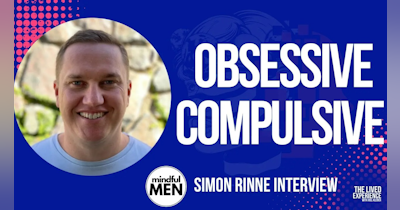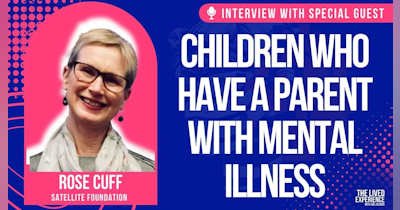JOEL: Based on your experience, what is your definition of bipolar disorder?
CARLY EVANS: I suppose when I got together my ex-partner, he was undiagnosed.
So, he had four manic episodes during the three years that we were together. And then the last 18 months he was in just major depression.
I think he was my first experience of being around anyone with bipolar I'd experienced a lot of people with depression, anxiety, that kind of thing, but not bipolar. So, he was my entry into that world.
And I've since worked with a lot of people who have Bipolar, and I've noticed that everyone has different cycles, there's generally mania, depression, a period of stability in between, but everyone's cycles can be different from what I've noticed.
Some people have long cycles in between some people don't necessarily get the as depressed, but they have more hypomania. Just seeming like they really a bit hyperactive and very, very energized, so that's not necessarily the type of mania that will lead someone into psychosis, which is what my ex-partner was in quite a lot, for quite a long time.
I've seen a lot of different types of bipolar with people and but what I've noticed a lot of is substance abuse goes heavily with it for pretty much all the people that I've encountered. Something else that I've found is that people really like being manic.
I think you mentioned that when you were talking about your mom as well, and I found that with my ex-partner as well, when they're in this stage of mania, even when they're psychotic. For them, it's not necessarily a problem. They're having a great time. It's the depression they don't like.
What was your overall impression of the psychiatric ward?
I've worked in the mental health space for a long time here in Perth, and there's no colorful land there, that's for sure.
They're just really depressing places to be. And I can't imagine what it would be like to be an inpatient there. They're not nice places to be in and I can see how even going in there with you know, I've worked with a lot of people who kind of will check themselves into places like that and private hospitals here in Perth for a bit of respite, I suppose.
But I can't imagine doing that on a voluntary basis. And then spending time in the energy of that with all the people around and everyone shuffling around drugged up on claws opinion, everyone looks a bit like a zombie.
And they're scary places. I go in there a lot as a professional, but they're still scary places. And especially when you're locked in there against your will, he came out a different person who was heavily medicated and stuff and not very accepting.
I don't think of his diagnosis. He didn't want to go back. He didn't go back. I don't know if he's gone back. I had to cut contact after I left him, so I'm not sure if he's been back in that scenario. But I know it wasn't a nice experience for him at all.
What would you do at a facility like that to make it safe still but more conducive to a healing environment, or more peaceful?
I think there's nothing wrong with having a bit of color in a place like that, the office that I work in now, there's color on all the walls, they're nice bright colors, there's art everywhere, they've got kitchens with like hanging fake hanging plants as balconies everywhere, so people get some nice sun exposure and stuff, there's plenty that they could do to make a place like that.
More inviting is completely the wrong word. But to make it more comfortable to be in to make it a bit more inviting, less clinical, and I think it really needs a bit of that something that that makes people I suppose a bit more reassured especially when they're in there for a long time because some people are in there for ages.
How did you deal with the relationship?
I've always been someone that's had a lot of personal development tools that I've been regularly using for myself, and keeping a routine I think, is important.
So, I know that if I don't exercise my mental health doesn't, eventually goes downhill. So, making sure you're eating the proper foods, drinking enough water, the real basic stuff, making sure you're getting enough sleep, which during that time, when you're in a relationship with someone with mania is difficult because they're awake, a lot more than normal.
So, you must manage that sleep disturbance for yourself, talking to people that are trusted, not talking to everyone.
I think before that I'm generally really an open book, I don't mind talking about my stuff at all. I don't care if other people talk about my stuff, generally.
But when I was with him, what I noticed is that I wasn't just sharing my own stuff. I was also talking about someone else's personal stuff.
So, I really had to be careful about who I spoke to, and really learned quite early on. People who I thought were trusted friends couldn't necessarily lean on them in the way that I wanted to.
So just having it became a very small group of people that I would trust, I suppose with that. Some people that I could be vulnerable with as well, who I felt like those times where I've been a mess that needed scraping off the floor.
They're the people that have done it. They'd feed me they'd give me water, they put me to bed kind of thing. It's like I was a kid again.
And just really talking to people.
The environment that the industry that was working in was helpful in a way because it's the field where you do have to do a lot of debriefing because of the nature of the work.
So, I would lean on my workmates, they understand a lot more about mental health and a lot of my friends did I use energy work a lot, so I did energy work on myself every single day didn't necessarily move me forward in the way that it does.
When I'm more stable and my life's more stable, but it kept seeing this picture of like a hamster on a wheel.
I felt like it was that and things like energy work and meditation and that stuff would just stop me from completely falling off sideways during those periods of time.
How can someone first identify themselves?
I think some people are really, really resilient and will come across as having a real Gallo sense of humor, and everything's they've got really good sense of humor, but it's all really dark and everything that they watch is all quite dark, and sometimes that is also representative of, they've gone through stuff and they're holding on to it and they can't, they're not necessarily focusing on the good stuff that happens in life.
So, some of the things that you might notice is that people are just jam really speaking cynically negatively, their first response to everything is just a negative one.
And people find it a bit difficult to be around them because they're a bit angry, irritable, they're just not really that fun to hang out with.
So, if you find yourself snappy and irritable, and if it's just easy to just reach for a bottle of wine or a beer, you’re finding that you would rather do certain activities that keep you busy, or take your mind off stuff, because you can't relax.
So, I think not being able to relax is a big one, not being able to spend time on your own is a big one. Because people get almost like itchy.
If you take any of those boxes, I suppose it's about really sitting there reflecting with yourself. Do I find it difficult to be alone? I need to always be filling my time with stuff? Do I drink a bit more than I should? Do or not sleep as well as I want to, are my relationships in my life going as well as I want them to? Or do people find me difficult to be around? and then I suppose the things that you can do about it?
Oh, I suppose lots of self-reflective type of exercises, and really spending time with yourself and going inward and going, why do I find this so uncomfortable? What is it about me just hanging out?
And thinking about my own stuff? That what is it about that that I find so uncomfortable? What is it what is coming up for me in those moments that I maybe can't cope with or can't deal with, and then finding a trusted friend that you can start talking to about that stuff, write stuff down, get it out of your head?
Do it I call it a brain dump, just jot stuff down on paper, it doesn't have to make any sense, and you don't have to start with dear diary or anything, just get stuff out of your head onto paper chat to someone go and see a professional if you feel like you want to or can.
But just reach out I think is an important first step. You don't have to know why exactly you're reaching out or what for or what it is that you're aiming for. Just start by reaching out to someone and just talk it through from there.
What would you recommend for someone who wants to deal with it and get to the bottom of it?
I think it can be both or one or the other, it depends on the situation, I think I get a lot of people coming to me for coaching, if I notice that they have some pretty significant trauma stuff coming up, I will always recommend that they're also linked in with a psychologist.
I think there is a huge benefit to psychology, when it's combined with coaching, especially because I think site counseling, you spend a lot of time talking about the problem repeatedly.
There are tools as well that they talk about, which are helpful in moving you forward. But coaching is very much solution focused therapy.
So, if you're doing those two things alongside each other, you're dealing with the trauma, and you're also moving forward, if you can find a coach that is informed in trauma, then it might “you can kill two birds with one stone”, I suppose.
But I think that slight counseling, psychologists can provide a bunch of different counseling techniques that coaches don't generally do.
So, like the EMDR processing, and I do work with EMDR and EFT in my coaching sessions, but I would say, going to a registered psychologist to do those things. For someone that's really, really knee deep in trauma would be really, important to do.
How does it work in regard to the science around it?
EMDR (Eye Movement Desensitization Reprocessing) is like a bilateral, they call it bilateral stimulation.
So, there are a number of different ways that you can do it. For anyone that might have heard about EMDR before, you might see like a psychologist moving their finger and you're supposed to follow with your eyes and track it.
While you're talking about the trauma. You can also be tapping on the opposite side of the body. And do that in several different ways. And your laser doesn't really matter. It's about stimulating the opposite side of the body to the opposite side of the brain if that makes sense.
So, what it does is unstick the stuck part of the brain that's stuck in that trauma loop to actually process it. Because those memories associated with the trauma haven't been processed to be able to deal with them.
A lot of people will go through traumatic stuff and not deal with it in the moment and then just wait for years and years and years to deal with it. And if that's stuck in the brain, then it needs to be resolved in some right.
And then EFT (Emotional Freedom Technique) is also known as tapping, you tap on various places on the mainly on the face.
So, there's like different acupressure points that you would tap. While you're talking out like loud ideally, you can also be saying it in your head about things that you believe to be true.
So, if you search on YouTube for EFT, and maybe put a keyword in like EFT trauma or EFT, PTSD, EFT anxiety, there's loads of stuff about anxiety, all you need to do is copy what the EFT practitioner is saying and where they're tapping. So, you literally just copy where they're tapping, you vocalize what they're saying.
And by doing that part of it is like a break state in that it, it moves you away from the negative emotion that you're experiencing at the time and helps you to neutralize it. And then part of it is that processing, I suppose out of the brain.
So, you can use EFT to move away from feelings that you don't want, and also to move towards feelings that you do want.
Whereas EMDR is much more focused on just relieving the trauma aspects side of things.
What should young people do who live in a highly stressed environment?
I think when you're a young child, speaking to a trusted teacher, at school would be important.
A lot of teachers, a lot of schools will have, peer support or school counselor and linking in with those people.
I think a lot of people are scared that child protection will just rock up and take them away from home, but the reality is quite different a lot of the time and when you lean into the right people, and you speak about what's going on.
No service ultimately wants to take split up families, the ideal situation is to get in there and figure out what does this family need?
What kind of support do they need to be able to move forward together as a family unit?
So, I think for children to speak out, not necessarily always to their mates, it depends what age they are, depends on what their mates, whether their mates are any good for them.
I think you're leaning on that support at school. With the pandemic over the last couple of years, there's now lots of online services, I think that are useful as well.
So, things like better help you hear lots of adverts for lots of like, 24/7, free support lines that that you can call things like lifeline.
Leaning into those supports in Western Australia, we've got a place called Headspace. I'm not sure if it's in other parts of Australia.
But headspace is really, great service for 12- to 21-year-olds, I think, maybe a little bit older. And so, headspace, they're really cool offices to go and check out because they are they're designed by teenagers and kids, so they're really colorful, they're funky colors, they've got iPads, that they check in and do a mental health assessment when they come in pool tables, places that kids want to hang out.
And like when we talk about places like great and nobody wants to hang out there. But headspace are cool places for kids to hang out in. It's almost like a youth club slash mental health service.
So, linking in with places like headspace is important, and teachers and school counselors and stuff will be able to do those referrals.
Big thanks to Carly for reaching out and for her time.
You can contact Carly via https://coachcarly.com/
Carly also has a lot of great resources on her website and it you're looking for some help, Carly would be a great option!











